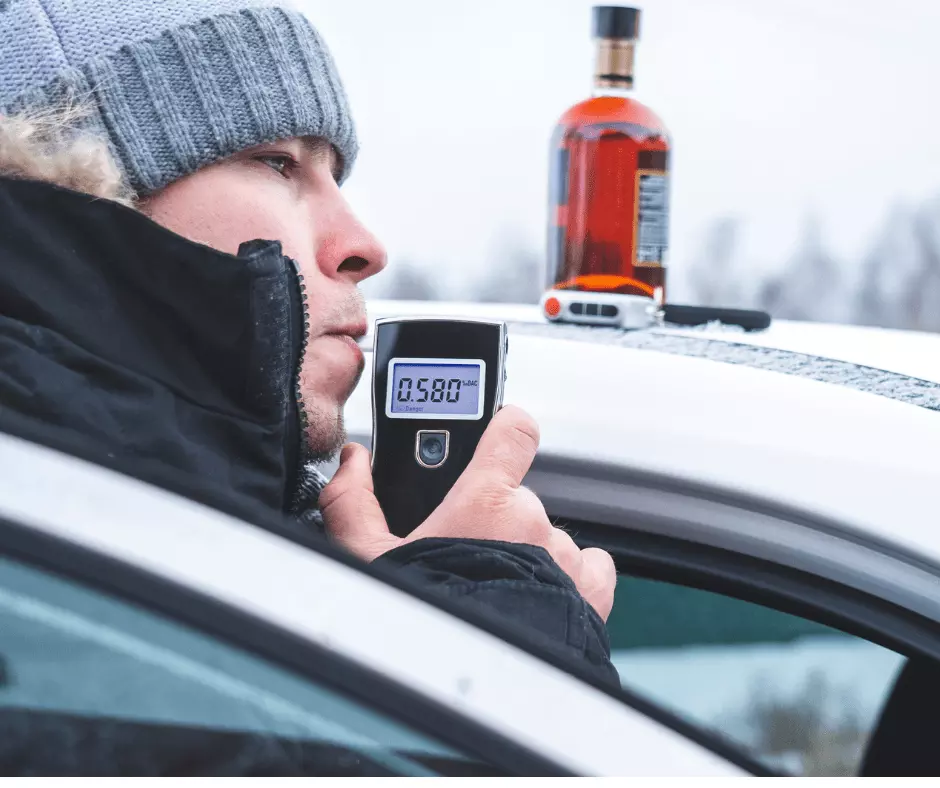Legal Limit for Alcohol in Colorado
Driving with a BAC of 0.08% or higher is illegal. Colorado prosecutors can file DUI per se charges regardless of impairment or safe driving. Field sobriety tests, like the walk-and-turn test, may support the case. It’s crucial to know that even with a BAC below 0.08%, you could still face DWAI (Driving While Ability Impaired) charges if your driving is affected. Stay informed and drive responsibly to avoid severe legal consequences.
This limit is strictly enforced to ensure the safety of all road users. However, Colorado laws are unique because you can be charged with a DUI even if your BAC is below 0.08%.
Protect your future from the consequences of a DUI charge. Contact us today for a private consultation!
Key Takeaways:
- Legal BAC Limits: 0.08% for general drivers, 0.04% for commercial, and 0.02% for underage drivers.
- DWAI: BAC between 0.05% and 0.08% can lead to a Driving While Ability Impaired charge.
- Penalties: Include jail, fines, and license suspension, with severity increasing for repeat offenses.
- Prevention: Recommends planning, knowing your limits, and staying informed about laws.
- Legal Help: Advises consulting experienced DUI attorneys for legal issues.
Driving Under the Influence

Colorado defines driving under the influence as the operation of any motor vehicle by a person with a blood alcohol concentration (BAC) of 0.08% or higher.
While this is the general standard, there are a few exceptions in which the Colorado legal limit for alcohol is below 0.08% BAC.
Driving While Ability Impaired
Under Colorado’s driving while ability impaired (DWAI) law, it is also unlawful for a driver to operate a vehicle with a BAC between 0.05% and 0.08%. This significantly decreases the alcohol you can legally have in your system while operating a vehicle.
A driver charged with a DWAI may not even appear intoxicated or unable to operate a motor vehicle. However, their BAC may still be over the legal limit.
For DWAI, even if a person seems to be sober and safe, they might be guilty of DWAI. It is a much lower bar for the prosecutor to prove, which is why it is imperative to have sharp defense counsel on your side.
Both DUI and DWAI carry similar penalties. However, the main difference is that a DWAI does not result in an automatic license suspension.
Underage Drinking & Driving
The DUI Colorado limit is much more restrictive for underage drivers. In Colorado, underage drinking and driving (UDD) refer to a driver under 21 with a BAC below 0.05% but above 0.02%. UDDs are often called “baby DUIs,” and most states have some form of a UDD statute to promote a zero-tolerance policy for underage drinking. Notably, the prosecutor does not need to prove the driver was physically impaired but only that their BAC was above 0.02% to convict someone of this crime.
Colorado has extremely harsh rules regarding underage drinking and driving, which is in line with the state’s zero-tolerance approach to underage DUIs (driving under the influence). Because the legal blood alcohol content (BAC) level for drivers under 21 is considerably lower than it is for adult drivers, it is crucial that these regulations be followed in order to guarantee road safety.
- Zero Tolerance Policy: The Zero Tolerance Policy imposes severe penalties for any alcohol found in underage drivers.
- BAC Limit for Underage Drivers: Compared to the typical 0.08% for adults, the legal limit for underage drivers is 0.02%.
- UDD Charges: If your blood alcohol content is between 0.02% and 0.05%, you may be charged with underage drinking and driving (UDD).
- Penalties: Sanctions may consist of fines, community service, license suspension, and required courses of study or therapy.
- Impact on the Future: A conviction may have an impact on one’s ability to drive, obtain school and work, and insurance prices.
Commercial Drivers
The DUI limit in Colorado for drivers holding a commercial driver’s license (CDL) cannot exceed 0.04% BAC. In addition to facing DUI charges, the Colorado DMV will suspend their CDL for one year, which can increase depending on whether the driver has any prior DUI offenses or was transporting hazardous materials at the time of the traffic stop.
Possible Penalties for Driving with a BAC Over the Limit
Even a first-offense DUI can lead to a minimum of five days but up to one year in jail, significant fines, and a nine-month loss of license.
If you are a repeat offender and face a third or subsequent DUI, you may be sentenced to at least 60 days behind bars and up to two years of driver’s license suspension.
Under certain circumstances, such as if you hold a CDL, these penalties can increase substantially, including facing a permanent revocation of your CDL license.
Preventive Measures and Safe Driving Tips
Driving safely and responsibly is crucial to avoid DUI/DWAI charges and ensure the safety of all road users. Here are some preventive measures and tips:
- Plan Ahead: If you intend to drink, arrange alternative transportation in advance, such as a designated driver, taxi, or ride-sharing service.
- Understand Your Limits: Be aware of how alcohol affects your body and make informed decisions about your alcohol intake.
- Use Technology: Leverage apps that estimate your BAC based on your drinks, weight, and time, but always err on the side of caution.
- Stay Informed: Keep updated on local laws regarding DUI/DWAI and BAC limits.
By adopting these measures and staying informed, you can contribute to safer roads and avoid the severe consequences associated with impaired driving.
Colorado DUI Limit Attorneys
At The Ferrell Law Firm, PLLC, our founding partner uses his unique knowledge and experience as a former prosecutor to help those charged with breaking the law, including DUIs.
Don’t let a drunk driving offense ruin your life. Contact us today to schedule a free, confidential consultation!